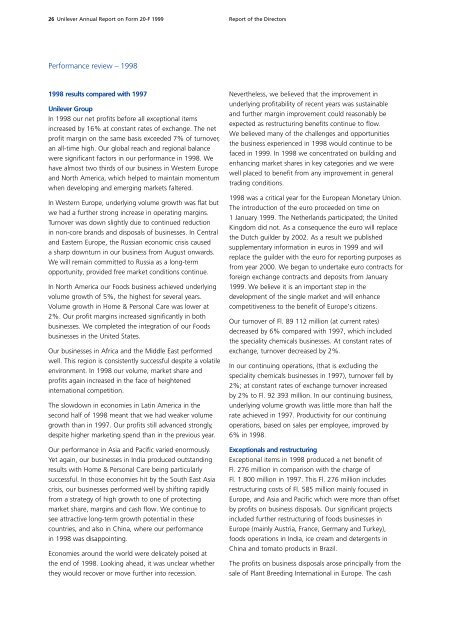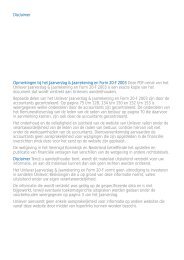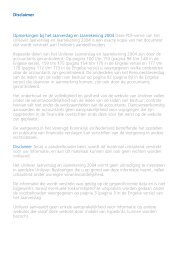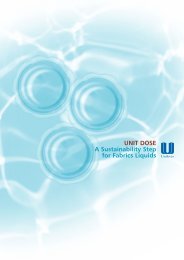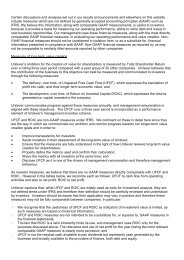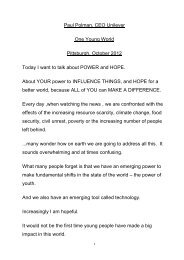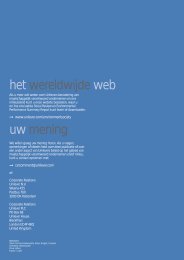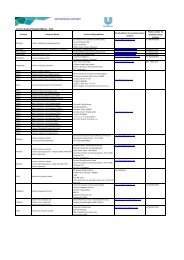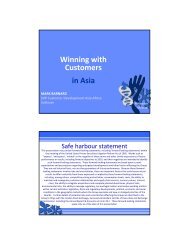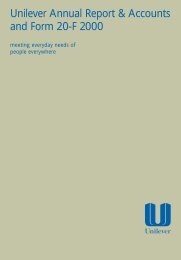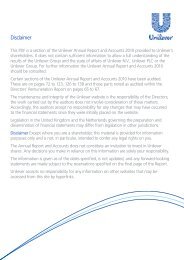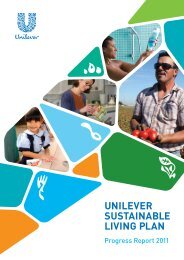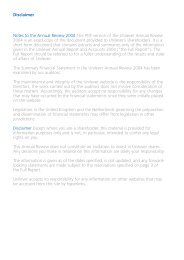Meeting everyday needs of people everywhere - Unilever
Meeting everyday needs of people everywhere - Unilever
Meeting everyday needs of people everywhere - Unilever
You also want an ePaper? Increase the reach of your titles
YUMPU automatically turns print PDFs into web optimized ePapers that Google loves.
26 <strong>Unilever</strong> Annual Report on Form 20-F 1999 Report <strong>of</strong> the Directors<br />
Performance review – 1998<br />
1998 results compared with 1997<br />
<strong>Unilever</strong> Group<br />
In 1998 our net pr<strong>of</strong>its before all exceptional items<br />
increased by 16% at constant rates <strong>of</strong> exchange. The net<br />
pr<strong>of</strong>it margin on the same basis exceeded 7% <strong>of</strong> turnover,<br />
an all-time high. Our global reach and regional balance<br />
were significant factors in our performance in 1998. We<br />
have almost two thirds <strong>of</strong> our business in Western Europe<br />
and North America, which helped to maintain momentum<br />
when developing and emerging markets faltered.<br />
In We s t e rn Europe, underlying volume growth was flat but<br />
we had a further strong increase in operating margins.<br />
Turnover was down slightly due to continued reduction<br />
in non-core brands and disposals <strong>of</strong> businesses. In Central<br />
and Eastern Europe, the Russian economic crisis caused<br />
a sharp downturn in our business from August onwards.<br />
We will remain committed to Russia as a long-term<br />
opportunity, provided free market conditions continue.<br />
In North America our Foods business achieved underlying<br />
volume growth <strong>of</strong> 5%, the highest for several years.<br />
Volume growth in Home & Personal Care was lower at<br />
2%. Our pr<strong>of</strong>it margins increased significantly in both<br />
businesses. We completed the integration <strong>of</strong> our Foods<br />
businesses in the United States.<br />
Our businesses in Africa and the Middle East performed<br />
well. This region is consistently successful despite a volatile<br />
environment. In 1998 our volume, market share and<br />
pr<strong>of</strong>its again increased in the face <strong>of</strong> heightened<br />
international competition.<br />
The slowdown in economies in Latin America in the<br />
second half <strong>of</strong> 1998 meant that we had weaker volume<br />
growth than in 1997. Our pr<strong>of</strong>its still advanced strongly,<br />
despite higher marketing spend than in the previous year.<br />
Our performance in Asia and Pacific varied enormously.<br />
Yet again, our businesses in India produced outstanding<br />
results with Home & Personal Care being particularly<br />
successful. In those economies hit by the South East Asia<br />
crisis, our businesses performed well by shifting rapidly<br />
from a strategy <strong>of</strong> high growth to one <strong>of</strong> protecting<br />
market share, margins and cash flow. We continue to<br />
see attractive long-term growth potential in these<br />
countries, and also in China, where our performance<br />
in 1998 was disappointing.<br />
Economies around the world were delicately poised at<br />
the end <strong>of</strong> 1998. Looking ahead, it was unclear whether<br />
they would recover or move further into recession.<br />
Nevertheless, we believed that the improvement in<br />
underlying pr<strong>of</strong>itability <strong>of</strong> recent years was sustainable<br />
and further margin improvement could reasonably be<br />
expected as restructuring benefits continue to flow.<br />
We believed many <strong>of</strong> the challenges and opportunities<br />
the business experienced in 1998 would continue to be<br />
faced in 1999. In 1998 we concentrated on building and<br />
enhancing market shares in key categories and we were<br />
well placed to benefit from any improvement in general<br />
trading conditions.<br />
1998 was a critical year for the European Monetary Union.<br />
The introduction <strong>of</strong> the euro proceeded on time on<br />
1 January 1999. The Netherlands participated; the United<br />
Kingdom did not. As a consequence the euro will replace<br />
the Dutch guilder by 2002. As a result we published<br />
supplementary information in euros in 1999 and will<br />
replace the guilder with the euro for reporting purposes as<br />
from year 2000. We began to undertake euro contracts for<br />
foreign exchange contracts and deposits from January<br />
1999. We believe it is an important step in the<br />
development <strong>of</strong> the single market and will enhance<br />
competitiveness to the benefit <strong>of</strong> Europe’s citizens.<br />
Our turnover <strong>of</strong> Fl. 89 112 million (at current rates)<br />
decreased by 6% compared with 1997, which included<br />
the speciality chemicals businesses. At constant rates <strong>of</strong><br />
exchange, turnover decreased by 2%.<br />
In our continuing operations, (that is excluding the<br />
speciality chemicals businesses in 1997), turnover fell by<br />
2%; at constant rates <strong>of</strong> exchange turnover increased<br />
by 2% to Fl. 92 393 million. In our continuing business,<br />
underlying volume growth was little more than half the<br />
rate achieved in 1997. Productivity for our continuing<br />
operations, based on sales per employee, improved by<br />
6% in 1998.<br />
Exceptionals and restructuring<br />
Exceptional items in 1998 produced a net benefit <strong>of</strong><br />
Fl. 276 million in comparison with the charge <strong>of</strong><br />
Fl. 1 800 million in 1997. This Fl. 276 million includes<br />
restructuring costs <strong>of</strong> Fl. 585 million mainly focused in<br />
Europe, and Asia and Pacific which were more than <strong>of</strong>fset<br />
by pr<strong>of</strong>its on business disposals. Our significant projects<br />
included further restructuring <strong>of</strong> foods businesses in<br />
Europe (mainly Austria, France, Germany and Turkey),<br />
foods operations in India, ice cream and detergents in<br />
China and tomato products in Brazil.<br />
The pr<strong>of</strong>its on business disposals arose principally from the<br />
sale <strong>of</strong> Plant Breeding International in Europe. The cash


